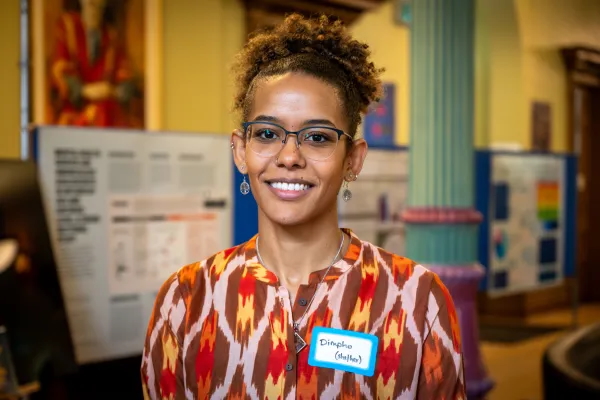Dimpho Radebe (IndE 1T5, ChemE PhD student) wanted to use her engineering degree to create positive change and impact everyday life. That’s when she found industrial engineering.
The field gave her a framework to consider the human side of engineering, such as systems, processes and psychological perspectives. But as Radebe moved through her undergraduate degree at the University of Toronto and into her career, she often found herself one of the few Black women in the room.
“For many of us who struggle with relating to traditional engineering culture, or just see ourselves differently as engineers, it can feel isolating,” says Radebe, a doctoral student in the Department of Chemical Engineering & Applied Chemistry in the Faculty of Applied Science & Engineering.
Questions about how engineers are trained, how they use their degrees and what defines engineering culture led Radebe back to U of T to pursue a PhD in engineering education.
As part of her studies, Radebe is currently completing the Collaborative Specialization in Engineering Education, an interdisciplinary initiative led by ISTEP, designed for graduate students pursuing research in engineering education. She has first-hand experience putting her research into practice in three undergraduate ISTEP courses — TEP324: Engineering and Social Justice, as an instructor, and TEP448: System Mapping and TEP445: Power of Story, as a teaching assistant.
Her research uses Black feminist autoethnography and critical race counter-storytelling to reflect on key moments in her engineering education and career from 2010 to 2024. She examines equity, diversity and inclusion efforts and explores issues related to the retention of Black women in engineering for educators and employers committed to decolonization and inclusion.
In recognition of her work, Radebe received the Outstanding Graduate Student Poster Award following her presentation Illuminating the Shadows of Engineering Education: A Black Queer Feminist Perspective, at the BRN Research Symposium. The award was made in collaboration by the Black Research Network and the U of T Black Graduate Students’ Association.

According a 2022 report from Engineers Canada, 25.2% of engineering undergraduate students in Canada self-identified as female, while 74.8% identified as male in 2021. A 2023 report from the same organization found that among practicing engineers, 86% identified as male and only 14% as female.
Canada’s narrative of multiculturalism — and the belief that racism isn’t as prevalent here — has led to less attention and research compared to the United States, Radebe says.
“I decided to begin with my own experience, given the limited data available, as a starting point for deeper exploration,” she says. “I wondered if personal insights could highlight the need for more research, especially from a Canadian perspective.”
Her work highlights not only exclusionary practices in engineering culture, but also the need for greater curricular flexibility and deeper discussions about navigating education, the profession and the recognition of various career pathways within it.
“My ultimate hope is that other engineering students who engage with this research feel validated in their own experiences and empowered to chart their own career trajectories,” says Radebe.




